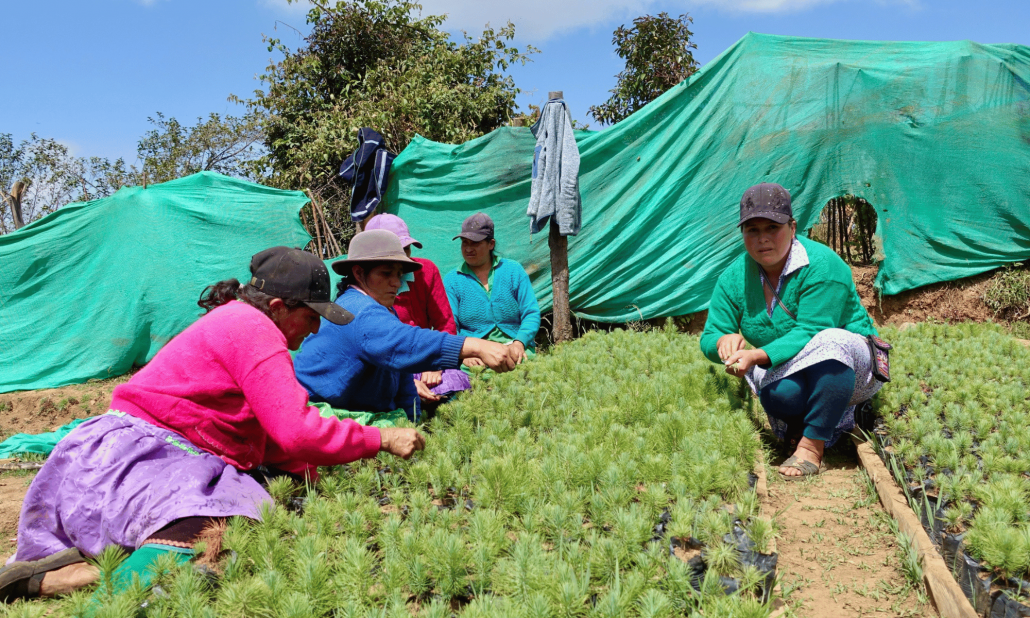Norandino
Norandino: Coffee Producer based in Peru
Famous worldwide for its unique flavour profile combining taste notes of milk chocolate, caramel and vanilla, Cafe Canchaque coffee is native to the Peruvian region its name derives from.
The Canchaque region of northern Piura is one of the only producers of high-quality, unwashed (“natural process”) coffees in all of Peru. Natural processing is the oldest, simplest method, and requires little machinery. Essentially, the goal of the method is to dry the whole cherry, achieved in three steps: cleaning, drying and hulling.
Founded in 1969, Cooperativa Condorcanqui is one of the oldest co-operatives in the Canchaque region of northern Piura. It is named after an indigenous hero, who in 1780, led a rebellion to improve the rights of indigenous Peruvians suffering under the Spanish Bourbon Reforms. Condorcanqui is a member of Shared Interest customer, Cooperativa Norandino.
Image: Norandino farmers taking part in training on gender issues
The Impact of your Ethical Investment
For the past several years, Condorcanqui have been working with Norandino to revive the traditional natural process coffees of the Canchaque region. The producers themselves say, recovering the Cafe Canchaque is both sentimental and a smart marketing move, creating a unique niche and distinguishing the region as one of the only producers of high-quality, unwashed coffees in all of Peru.
Norandino was founded in 1995 with 200 members. Today, the group has grown and diversified, representing over 6,000 coffee, cocoa and sugar cane producers. In 2006, they approached Shared Interest for finance to develop and upgrade their coffee processing unit. They have continued to be a customer since and have grown their operations across six regions of the north of the country.
Norandino is now one of the largest Peruvian co-operatives in terms of members, production volumes and exports, and is in the Top 10 in the 2023 ranking of coffee exporters in Peru. They have worked collectively to improve quality and overall production under certified organic practices, and have increased their exports from 550 quintals of coffee in 1997 to nearly 40,000 quintals into specialty markets in North America, Europe and Asia. Farmers also enjoy access to financing and to development projects, and they are one of the few producer groups that has managed to diversify its income.
This has facilitated the diversification of their production base to include a range of products from panela (raw brown sugar), jams and cocoa, to crafts and tourism. Norandino farmer, Jose Asunción Campos Chinchay, said:
“The impact that Norandino co-operative, that I represent, has generated on the member is that it allows us to produce a quality product in good conditions and is responsible for finding an international market that pays a fair price. The financing we receive as a campaign advance allows us to work on all the work and expenses involved during the harvest."
Image below: Norandino farmers taking part in training on gender issues

Empowering Smallholders, Transforming Communities
Norandino currently produces Arabica coffee, brown sugar and cocoa bean liquor. In addition, it offers the service of processing coffee to local co-operatives and international buyers. Furthermore, it produces some final derivative products for the local market such as roasted coffee and plain chocolate bars (for making hot chocolate). Looking ahead, Norandino plans to expand its portfolio of final derivative products for the international market.
Members also benefit from projects aimed to improve sustainability and development of production chains. Recently, they have developed a new technological business plan for their coffee, cocoa and panela production chains for 2024.
In 2023, Norandino achieved:
Reforestation
From 2010 to 2023, a total of 678 hectares were reforested, equivalent to the planting of 752,770 trees. Of this total, 82% corresponds to exotic species; while the remaining 18% is made up of native species. In 2023, they reforested 85 hectares, 65 hectares of pine and 20 hectares of native species, totalling 94,435 trees.
Carbon credits
Norandino carbon credits have been certified with Gold Standard and Fairtrade since 2017, which establishes a minimum price of EUR 13 and a premium of EUR 1.5 per credit. Since then, 19,430 credits have been sold to Fair Climate Fund from The Netherlands that represented an income of EUR 282k. In 2023, the co-op have sold 4,838, generating an income of EUR 281k credits.
EUDR Compliance
To comply with new European Deforestation Regulation (EUDR): Geo-referencing has been carried out since 2020 and is 95% complete to date. After completion of this phase, the diagnostic phase will begin to identify those plots that have been deforested in recent years.
Support our work
